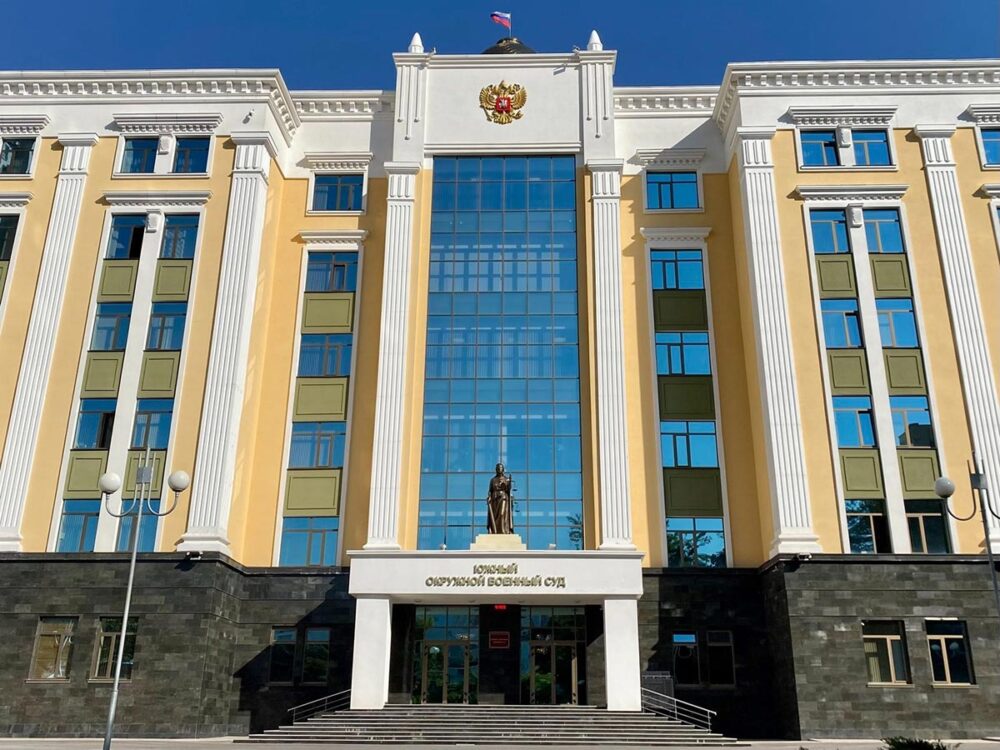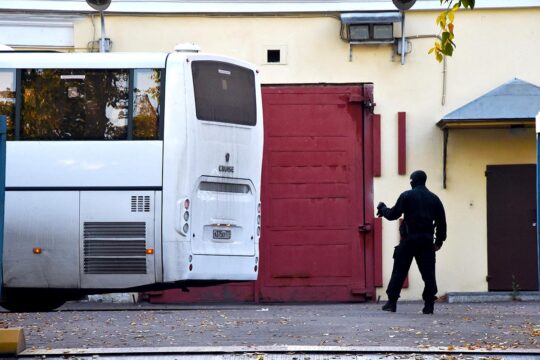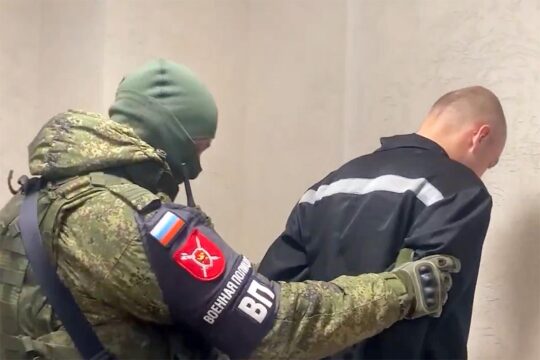A group of 22 Ukrainian prisoners of war is being tried in the main military court in southern Russia. Almost every week since their trial in Rostov-on-Don opened on June 14, the defendants are extracted and transported from their detention centres located in this economic and cultural capital of southern Russia, which has become a strategic centre since the start of the invasion of Ukraine. The defendants are accused of participating in a terrorist organization and attempting to overthrow the constitutional system in the Donetsk People's Republic (DPR). Among them are nine women, most of whom served as cooks in the “Azov” battalion. According to the defence, among the group of defendants, seven were effective members of the battalion between 2018 and 2021, and only six were active servicemen of the National Guard of Ukraine at the time of their arrest.
Quotes from Alexander III and Putin
The hearing, on September 20, was delayed due to problems with transporting some of the defendants and the tardiness of a lawyer. Despite this, people were gathering near the courtroom on time. At the entrance, there is a poster expressing support for the "special military operation". It reads: "We will demand answers for every drop of spilled blood! You can't negotiate with evil. Evil does not understand grand gestures. Evil must be torn apart!" Similar posters with different slogans are displayed in corridors, in front of the elevator. Some feature quotes from Russian emperor Alexander III and president Vladimir Putin.
Lawyers are the first to enter the courtroom. After a confidential communication with the court, around 10 listeners are allowed in. Some of them are law students from a local university, discussing their upcoming classes on civil law and criminology.
A small group of attendees consists of friends and relatives of the accused cooks. One woman positions herself to have a view of the right side of the "aquarium", where defendants sit. The faces of three of the women detained are tear-stained and swollen. One of them, wearing glasses with a thick black frame and a bright pink sweater, periodically wipes her eyes with a handkerchief. This is Elena Abramova. Her 18-year-old son and childhood friend will be questioned in court today. They are not here yet.
Security guard with a skeleton smile
As the start of the hearing approaches, eight security guards surround the glass "aquarium". The mask worn by the first one stands out from the others—it bears a skeleton smile. Each of the eight security guards holds a rifle at the ready.
The 22 defendants sit on benches in two rows. Mostly men occupy the left side, three of them sporting the typical military "shaved head" hairstyle. The women are positioned on the right side. One of them, wearing a grey sweater, attempts to convey something through sign language to an acquaintance who has come to support her. After a couple of minutes, a security guard stands right in front of her, making further communication impossible.
On the judge's desk, there are three boxes with makeshift handles made of tape. Each box contains seven volumes. Seven more folders with bright yellow bookmarks and flashy coloured files were brought by judges. The case is being heard by three military judges, headed by Vyacheslav Korsakov, whose name is known in Ukraine for having previously sentenced Ukrainian director Oleg Sentsov and Ukrainian activist Oleksandr Kolchenko.
Open day in “Azov”
Marina Dubrovina, the lawyer of Elena Avramova, requests that the defendant’s son Ivan Avramov and her friend Olga Zemtsova be questioned. The court agrees and suggests starting with the son. A modest young man in a grey sweater enters the courtroom. Ivan, 18, was born and raised in the village of Urzuf near Mariupol, in south-east Ukraine. It was in the town of Urzuf that Azov's military base was originally located. When asked about his nationality, he states that he is Greek.
In 2013, Ivan’s father died and they with his mother were left alone. Ivan recalls his mother's first job: "She was an entrepreneur, selling women's clothing. After that, she took on part-time work at a store. I know that she received a secondary education and became a pastry chef. She started working in her field after leaving the market." His mother joined the battalion based on a recommendation, he said, but Ivan is not sure who specifically invited his mother there: "In 2020, I was finishing school, and I needed to pursue further education. I planned to attend the Donetsk Law Institute in Mariupol, but it required money. In the end, I got accepted, and my mother helped me a lot financially."
He never saw her in a uniform or with weapons. "Once, there was an open day at the military unit, where they invited the children of employees to see where their parents work. My sister, two nieces, and I went there, had a meal," he recalled. During that visit, Ivan took a photo of his mother wearing chef's attire. Later in the hearing, the photo was shown to the prosecutor, and the court decided to include it as evidence in the case.
The prosecution had no questions, and Ivan returned to the second row of seats where he was sitting. Afterwards, he repeatedly wiped his eyes with the sleeve of his grey sweater.
The second defence witness was Olga Zemtsova, a childhood friend of Elena Avramova. Olga was also born in Urzuf and also identified herself as Greek by nationality. According to Olga, in the 1990s, after completing school, Avramova worked at a boarding house. She then started her own business, which was doing well. "But in 2014, things worsened in the market, as they did in the country as a whole. Sometime around 2013-2014, Elena's husband passed away, and it became very difficult for her," Zemtsova recounted.
She also recalled that Avramova's son was planning to attend university, but they needed money: "She was invited to do some part-time work at a store near the military unit. At first, she was filling in for someone, and then she started working as a cook." It was just a regular job for her: "I know for sure that she was baking bread there. There weren't any jobs in the village, and it was difficult for her to pay for utilities. After her husband's death, it was really tough for her." The prosecutor did not pose any additional questions to her either.
In addition to the testimonies, the court included in the case file materials a letter of reference on her character written for Avramova from five neighbours, a copy of her secondary education certificate of "baker", and an excerpt from the Ukrainian register of individual entrepreneurs.
“Azov's canteen offered the highest salary”
Since the prosecution finished presenting evidence, the defendants have started giving testimonies during the recent court sessions.
On September 20, Liliya Pavrianidis, 29, appeared before the court. Dressed in a black zip-up sweater, her long brown hair pulled back from her face with two hairpins, she stood up from her seat and walked straight towards the glass to answer the questions from the court and from her lawyer. She started to recount that she was born and raised in Berdyansk – a city located near the Azov sea, in the south of Zaporozhye region, southern Ukraine – and obtained a higher education degree in 2018, becoming a food industry engineer.
After finishing university, she moved to Moscow, but returned to her hometown of Berdyansk six months later in December 2019. "It's a small city, a resort town, and there aren't many job opportunities there. But in Urzuf, they offered a somewhat decent salary. That's why I made the decision to work as a cook in the Azov battalion's canteen," Pavrianidis said. "I didn't know much about other battalions, and I even learned about Azov shortly before deciding to go there. It was the closest to home, and they offered the highest salary."
“Were you aware of the Azov battalion's views?” asked the prosecutor.
“We never discussed this topic in personal conversations.”
“How did you feel about the decision regarding the separation of DPR and LPR from Ukraine?” continued the prosecutor.
“Neutral.”
Liliya's job was only to cook. Despite this, she was assigned an automatic rifle for a period of three months: "But I never saw it and never held it in my hands."
“Did you undergo any training on handling weapons?” asked the prosecutor.
“No. We only had a three-day basic training as part of the National Guard of Ukraine's inspection. But it was purely a formality; we sat in the classroom waiting for the inspection.”
“Did you go to shooting ranges?”
“There was one outing, again related to the inspection.”
“Was it also a formality?”
“No, we did shoot there. Personally, I fired from an automatic weapon.”
Prior to the war, Pavrianidis worked in a canteen from 4 am to 7 pm, mainly serving food and preparing salads. She said she lived there because Berdyansk was 60 kilometres away, and it was too far to commute. Usually, she only returned home on weekends.
“We worked till March 17 in Azovstal”
On February 24, 2022, along with other cooks, she was transferred from Urzuf to the "Azovstal" metallurgical plant in Mariupol, located at about an hour's drive from Urzuf.
During the heavy battle with the Russian forces, the distribution of responsibilities changed: "At Azovstal, everyone helped each other and did not stick to a single process. We worked until March 17. Then the last kitchen was damaged. Our head informed us that the commander had given permission for the women to leave Azovstal," Pavrianidis recounted. They couldn't leave earlier: "We couldn't leave the territory on our own; we wouldn’t even get to the checkpoint alive. Plus, I didn't know the building's architecture [the plant had many underground rooms and passages, with a total area of 11 square kilometres]."
According to the defendant, in the evening of March 17, she and other women were taken in groups to Mariupol the city centre: "There were eight of us, and we split up. Each group made their own decision. We decided that we needed to find a checkpoint to surrender. We realized that if we stayed in the city, we probably wouldn't survive," the defendant recalled, with noticeable pauses between words.
By midnight, the group of women reached the nearest checkpoint, where they were detained by representatives of the Donetsk People's Republic and the Chechen Republic.
“I had a bag on my head”
The first procedural document regarding Pavrianidis' detention was drawn up on March 20, three days later. She was handed an administrative detention for 10 days. "On April 13, I was transferred to the General Prosecutor's Office in Donetsk. During the first interrogation, they said I didn't need a lawyer," the defendant recalled, noting that her statements were not recorded in writing. Nonetheless, she was unable to refuse signing the protocols.
“Why couldn't you refuse?” her lawyer asked.
“Because I had a bag on my head at the time.”
“And the signatures?”
“Well, at the moment when we were supposed to sign, they untied our hands, removed the bags, and told us to sign.”
The defendant does not admit guilt in the case. Based on her responses, the prosecutor concluded that Pavrianidis disagreed with the legal qualification of the events but acknowledges all the factual circumstances.
A visit to DPR and a witness from Kyiv
Then the court considered several motions from the defence, composed of both court-appointed lawyers and lawyers by agreement. Yaroslav Zhdamarov's lawyer filed a motion for the examination of physical evidence - "a notepad with personal property notes" and "a questionnaire in the name of Yaroslav Zhdamarov" – that is held by the investigative department of the Donetsk People's Republic (DPR). According to him, the prosecution was unable to arrange for its transport to Rostov-on-Don. Because of this, he asked the panel of judges to hold a visiting court session in the DPR. The Russian Criminal Procedure Code allows for such a possibility, although such hearings are very rare.
"Seriously? We would all go together for a visiting court session? Did you discuss this with your colleagues? I'm actually curious to hear the defence's opinion," said Judge Korsakov. But other defence lawyers supported the idea. The court still rejected the motion, considering that there was "no procedural necessity" for a trip to the DPR.
Oleg Mizhgorodsky's lawyer asked also for the court's assistance. As part of his examination, the defence counsel said he spoke with a former servicewoman, Rolana Bondarenko, who worked in the battalion's personnel department during the same period as his client. Bondarenko told the lawyer circumstances that hindered Mizhgorodskyi from resigning from his service. The attorney explained he conducted the interview via video call, as Bondarenko resides in Kyiv, the capital city of Ukraine. The lawyer said that with the court's consent, he would be able to have her in court, through video conferencing.
"On December 20, 2022, [Ukraine's president] Zelensky signed the law on Ukraine's withdrawal from the convention on legal assistance and legal relations, thus we are unable to obtain the evidence that is in Ukraine. And she cannot come to the court," the lawyer said. The court decided to include in case materials the transcript of Bondarenko's interview and said that it was willing to explore ways to listen to her new testimony during the court session so that she could have witness status. The prosecutor did not object to this.
In total, defence lawyers asked for the right to hear around 20 persons, and only a few defendants have testified so far. The next hearing is scheduled for September 27.







